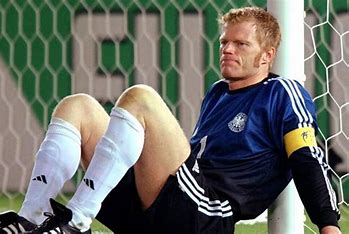
“Two billion people watched me fail,” says Kahn in a recent statement while remembering the 2002 FIFA World Cup final.
In Brazil’s 1-0 first half lead, Rivaldo shot from distance, Kahn failed to keep the ball firmly in his grip, and Ronaldo scored from the rebound.
After the game that ended 2-0 in favour of Brazil, Kahn sat down looking devastated and sadly leaning against the goalpost. That was the sad look of a defeated man who did everything in his power to make sure that a talentless, old Germany team could reach the final.
And that determination is what made Kahn become defeated mentally, so he says. He slipped into depression.
Kahn plunged into a deep self-doubt after the final whistle. A well respected, and feared goalkeeper, sometimes greeted with bananas or monkey noises when he is between the goalpost in the stadium. The aggressiveness, the motivation and the determination are what made him defeated.
Full of energy and mentality. Sometimes the energy and drive to win drains you so much that the failure that follows is an even harsher lesson. Sometimes it is accepted, sometimes it changes you as a person.
“The determination and the mistakes drove me into a tunnel. It was like a burn-out and exhaustion. Sometimes, I found it harder to even take the stairs,” recalls Kahn.
The 2002 World Cup was not the only failure in his sporting career. The 1999 Champions League final against Manchester United, where Bayern conceded two goals in the injury time after leading 1-0 for the entire 90 minutes.
At Kahn’s peak, the depression had always become a topic of mockery, but nobody guarantees that it is not a topic of mockery in the modern day society either.
Kahn, while knowing the stigma around depression and mental health issues, decided to take sessions with a therapist, which helped him win a lot of personal battles. The talk of depression in public would have ultimately ended his career prematurely.
Something among the lines of “For God’s sake, there is no way this is going out publicly!” was the attitude of those who could not come out with relief due to the fear of being mocked and misunderstood.
Instead, Kahn went into a stage of acceptance. He took therapy sessions which made him become not only a more balanced footballer, but even more so as a person. While sitting on the bench behind Jens Lehmann in the 2006 World Cup, Kahn became more supportive towards his rival. The “old” Kahn, would have never accepted it.
Around Kahn’s peak, again, he was not the only patient from Bayern that suffered from mental health issues. Sebastian Deisler, one of the most celebrated German talents of his time, fell into depression due to the constant injuries that hindered his career, later on, he finished his career emotionally and defeated. He was also another patient of Florian Holsboer, Oliver Kahn’s personal therapist and medical professor.
Uli Hoeness, the sporting director at that time, also was aware of the mental health stigma of that time. According to the therapist, Hoeness told him, “I don’t care what they say and write in the media. I just want the boy [Deisler] to be well again”
Almost two decades later, Kahn now sits as the chairman of one of the biggest clubs in history. A completely changed person, diplomatic and calm, attitudes which some of the Bayern fans do not welcome, as they were always used to seeing Kahn passionate and driven. And when the club faces crisis, you cannot afford to see Kahn calm and diplomatic.
“When we were eliminated by Villarreal in the Champions League, I stayed calm. This is not always well received,” said Kahn. “I wanted to change things. To change my persona in my job. I didn’t want to run away.”
Kahn wants to remove the stigma that exists around depression and mental health issues. He urges people to always seek professional help, there is no shame in it.
- A Tell report











